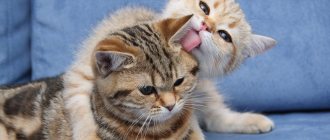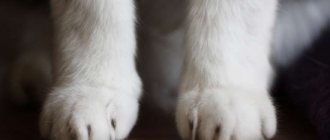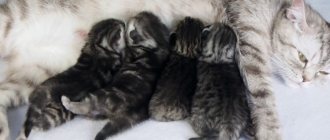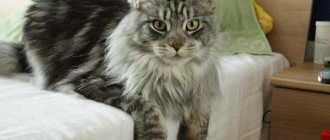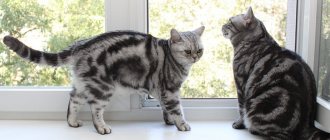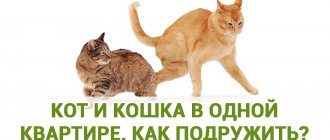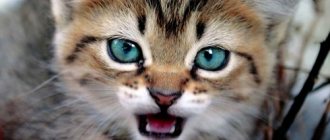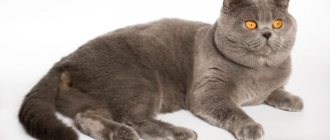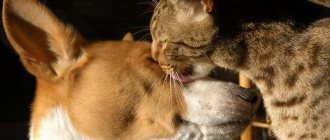For caring owners this is often not enough. Our mailbox regularly receives letters with non-standard questions and descriptions of situations of concern to animal owners related to pregnancy in cats. In this regard, we decided to seek advice from high-level specialists. Today, the doctor of the Vega clinic, candidate of veterinary sciences, Alexander Dmitrievich Kablukov, answers the most popular questions about cat pregnancy.
— What tests are best done on a cat before mating?
— It is necessary to be tested for the presence of hidden infections: chlamydia, mycoplasmosis, ureaplasmosis.
A vaginal smear is taken and examined using the PCR (polymerase chain reaction) method. Is it possible to breed cats - brother and sister, father and daughter, son and mother? What are the consequences of inbreeding? - You can, if you want to get mutants. Inbreeding is prohibited for everyone. Such breeding significantly increases the likelihood of developing mutations and genetic abnormalities.
— How long after giving birth can a cat become pregnant again?
- 14 days after giving birth, cats go into heat and can become pregnant again.
— Can a cat get pregnant at 15 years old?
- Yes, but it’s bad for the cat and the offspring.
The birth will not be normal. — What threat to a cat’s health does early (at 7-8 months) and late (after 10 years) pregnancy pose?
— At 7–8 months this is not an early pregnancy.
She is early by the standards of human views, but by the standards of physiology this is a completely normal age. Late pregnancy can threaten the development of diseases of the mother and fetus. How to reliably determine whether a cat is pregnant? Are there any special pregnancy tests for cats? — There are no special tests. The only reliable diagnostic method is ultrasound examination (ultrasound). It is carried out starting from the 30th day of pregnancy of the cat.
— Can a pregnant cat ask for a cat?
- Usually no, this does not correspond to normal levels of hormones in the blood.
If this is the case, then the cat has a pathology. — How to distinguish a real pregnancy from a false one?
— False pregnancy is a neuropsychic disease of an animal in which, after a certain period after estrus, usually two months, the animal begins to show signs of pregnancy: lactation, withdrawal, certain toys appear, which the animal nurses as its own offspring.
This pathology is typical for dogs and does not occur in cats. Does a cat have to gain weight? Does it happen that a cat’s pregnancy is almost invisible? — Some cats do not change their constitution until their last days, and by appearance it can be difficult to distinguish a pregnant cat from a non-pregnant one.
— What does a pregnant cat’s diet consist of? Will professional food be enough for her or should she be given vitamin supplements? Usually there is enough food, just increase the daily volume of the diet. But using vitamin-mineral complexes during pregnancy will never be superfluous.
— What to do if a pregnant cat sheds heavily or her whiskers break off?
— It is necessary to analyze the diet and include vitamins and minerals in it.
— Is it possible to bathe a pregnant cat?
- It is possible if the cat tolerated bathing well before.
— If a pregnant cat periodically mates with a male cat, how can this affect the kittens?
“Usually this does not happen and may indicate a pathology of the animal’s hormonal levels.
But in general, mating cannot harm the fruits. Behavior
— If a pregnant cat ignores the litter box, what could this mean?
- This is not a serious sign, but this can happen, including with the development of inflammation in the bladder.
You need to check your urine. — Is it typical for a pregnant cat to refuse food?
— No, this may indicate the presence of some pathological changes: the appearance of pain, nausea, the development of inflammation, etc.
— Is it harmful for a pregnant cat to lie on a hot radiator all day?
- No.
— Can kittens be harmed if a pregnant cat lies on her stomach?
No.
— Can a pregnant cat make new unusual sounds?
- No, all sounds are normal.
Rather, it is a feature of the behavior of a particular individual. — Is it normal for a cat to become angry during pregnancy, constantly growling and hissing?
- No, this is not normal, but it can occur during pregnancy and childbirth.
In this case, the animal is not allowed for breeding and must be sterilized. Health
— Is it possible to vaccinate a pregnant cat?
— It is not advisable to do this, since vaccination can cause the development of fetal diseases.
— How to rid a pregnant cat of fleas?
- It is best to treat for fleas before pregnancy, but if they are still present, it will be better to treat with mild preparations such as Frontline spray.
— What to do if a pregnant cat has worms?
— If this is detected, then it is necessary to treat the cat with mild preparations, for example, drontal for cats or dosalid.
— Is it a pathology if a pregnant cat has a larger belly on one side than the other?
- No, this may be due to the uneven location of the fetuses in the cavity of the uterine horns.
— What can cause bleeding in a pregnant cat?
- Either with the onset of the birth process, or with pathology of the uterus.
— What does discharge from a pregnant cat indicate?
- Most often this is due to an infection of the uterus or vagina.
— Are diarrhea and vomiting a dangerous symptom in a pregnant cat?
- Such symptoms usually indicate poisoning with something that requires appropriate treatment.
— A pregnant cat sneezes often.
What could it be? - This can be associated either with a cold or with the presence of diseases of the upper respiratory tract, more often with polyps of the nasal passages.
What to do if a pregnant cat falls from a height, but no changes in behavior are observed? How can you tell if kittens have been harmed? — It is necessary to conduct an ultrasound of the uterus to determine bleeding and fetal viability.
Does your pregnant cat have brown growths between the hairs on her chin? What is this and what causes it? - Most likely, this is acne - skin lesions associated with excess sebum production. This manifests itself with a decrease in immunity or with the development of certain metabolic diseases.
— Is it possible to sterilize a pregnant cat?
- This procedure will certainly cause a cessation of pregnancy and lead to a miscarriage.
To terminate a pregnancy surgically, it is better to resort to amputation of the uterus or sterilization of the animal after birth. The story is like this. Six years ago, a tiny cat, three weeks old, appeared in our house. She was a real savage, not letting anyone get close to her, as soon as you reached out your hand to stroke or pick her up, she would do a “cobra throw” and dig in with her teeth, claws, and even scream or hiss. In general, it was a bundle of nerves, fleas and panic. But we did not give up and removed the fleas and gave our Muska the opportunity to calm down and get used to the idea that no one was going to offend her.
Time passed and Muska grew into a very beautiful and affectionate cat with a unique character. You could pet her when she wanted it, that is, she would come, lie down next to her or on your lap, and then you could pet her. Sometimes Muska did this - she “called” from another room, I went out, and she... fell to the floor, collapsed with her stomach up and asked to pet her. I laughed and stroked, of course. A cunning and smart cat. Yes, she did not allow our grandchildren to stroke her, she could scratch her painfully and they were afraid of her and avoided her. But when she wanted affection, she could come up to them herself and lie down on her knees. We have our own house and Muska became a thunderstorm for the neighbors’ cats and the cats that dared to wander into our yard - she chased everyone away. Including dogs.
Muska turned out to be so attached to me that I no longer knew where to go from her cat-like love - she followed me on my heels. If I go to a neighbor’s house, Muska will come running and sit in front of the front door until I leave, and then she rushes towards me with a loud meow, saying that she has finally appeared, why is it taking so long. It happened and she followed me to our village store. Well, in the house he never leaves my side. If I'm preparing dinner, she sits on a chair under the table or on the floor in the middle of the kitchen. If I do sewing, then she will find a place nearby. If I iron clothes, then I can’t do it without Muska. Imagine, he even goes to the bathhouse with me! One day I went there and didn’t notice how Muska slipped forward into the hot bathhouse. Or rather, I couldn't stop her. Well, I think, then sit and fry. Yeah, that's how she got scared. At first she was sitting on a shelf, but I removed her from there and sat her on a bench by the door. She sat there and didn’t leave until I washed myself. And so, usually, he sits in the dressing room and waits.
We can talk a lot about our cat. And she gives birth to kittens regularly - she is an excellent mother! Then we give everyone away. Three times they kept Muska's male cats. Twice they got lost, disappeared somewhere from the yard, not having lived a year. Then a friend begged for a 7 month old. So now we decided to keep the cat. He is already 5 months old. Muska loved all the abandoned kittens very much and did not give offense even to those who were already grown up and big. She looked after them and licked them. Even when she gave birth to others during this period and when the kids grew up, she did not drive away the older one, she also licked him. And I just can’t stand this!
Everything was fine until Vaska was two months old. As if Muska had been replaced, he hisses at his cat son and rushes to fight him. They decided that she was pregnant. We thought, let's wait, it will pass. But she was not pregnant. The cat Vaska is already 5 months old and for Muska-mama he is simply enemy No. 1. What should I do? We love both!
Please tell me, is it permissible to mate a brother and sister? Alina
If the word inbreeding
Familiar only to specialists, then
everyone has probably heard incest What is this? Simply put, incest is a relationship between close relatives.
But this is terrible! For people - perhaps, but for animals - a common thing. Moreover, all breeds were bred this way.
So what happens, you can easily breed any animals, even those who are related by blood?! Well, no, genetics and selection are a “delicate matter”, they require a careful and competent approach, otherwise something like this can be done...
Let's look at the question in a little more detail, but not too deeply, just to understand the essence.
In general, breeding can be done through outbreeding
(crossing of unrelated individuals),
linebreeding
(crossing “along the line”, that is, mating of distant relatives who have a common ancestor somewhere in the 3rd or 4th generation) or
inbreeding
(crossing of close relatives (can be close (incest), close, moderate and distant )).
Is it necessary to breed a cat for health?
A short introduction. When you buy a new mobile phone with a ton of different features, how do you get the hang of it? Are you reading the instructions? Or do you just point at the screen intuitively? However, in recent years, developers have left you no choice - there are no instructions in the box, and finding them on the Internet is not an easy task.
Only recently did I realize that the same thing is happening to cats now. If you listen to older people, city dwellers who bought a cat for an apartment (this is a different attitude than before in rural areas), then, usually, they also bought a book and could find out some very basic things in it: what is the cat’s body temperature higher than human, that a cat’s body does not sweat, and so on.
Nowadays, more and more people buy a cat “without instructions” and then go online for information. And this is not bad at all, but usually people don’t know what to ask a search engine until they encounter something unknown to them. Or they may encounter it every day and not understand that this is something they don’t know.
For example, this “unknown” often turns out to be the difference between the menstrual and estrous cycles (people think that any mating of a cat on a cat at any period of its cycle can lead to pregnancy, or that during estrus a cat cannot become pregnant - however, after two months they begin to realize their mistake... just when the kittens are born...))
Ethical aspect: If I want to have children, I have the right. And if my cat wants to have children, I am obliged to give her this opportunity (otherwise I’m selfish, angry, don’t like cats, or something like that). This is the reasoning of those who insist on “at least one mating for each cat.” And this brings us back to the main difference between people and pets (and that is pets). People are responsible for their actions. People are responsible for the actions of animals. People provide animals with food, a roof over their heads, prevention and treatment of diseases, and safety. They receive care, we provide care.
If we compare animals with people, we should compare not with adults, but with children who will never become adults. Children at 12-13 years old can physically reproduce... But is this good for them? This can ruin their life, maybe not always, but in many cases. In terms of the level of understanding of their actions and their consequences, cats do not even reach the level of a teenager; they usually do not exceed the level of a child aged 1 year (rarely, rarely 3 years). So, if you compare cats and people in the context of “every cat needs to be mated at least once,” then compare cats not with adults, but with 1-3 year old children. It sounds rough... but closer to nature.
Physiological aspect: Pregnancy, childbirth, and feeding a baby is a big burden on the body. What is her excuse? The happiness of parenthood, procreation (preservation of one’s genotype).
In nature, most of the first litters of cubs die. This happens for two main reasons. 1) Maternal behavior is associated with a certain hormonal background to which the brain reacts. The brain has a kind of memory. If the hormones of maternal behavior have already acted on him and he “turned on,” then next time he turns on faster. During the first birth, maternal behavior “turns on” with a delay or is weakened. 2) Colostrum (the fluid that is secreted from the mammary glands before milk begins to be released) is a “compote” of immunoglobulins and antitoxins that protect newborn babies from infections. During the first birth, the concentration of whey proteins in colostrum is lower than during subsequent births. On an industrial scale, for example, on dairy farms, the quality of colostrum is determined by a special device. Usually, in the first days after birth, all calves are fed colostrum from cows that give birth 3-5 times, and colostrum from primiparous cows turns out to be useless (= without benefit).
In captivity, if you let a cat “give birth once,” this means that you are creating an experience for him (quite physically - you are preparing his brain and body for subsequent births) that he will not need, but for which the animal will already be designed (will waste resources) to a much greater extent than before. These are resources that would otherwise be used to maintain health and longevity.
Very often, during the first birth, you will not see the “happiness of parenthood” in the cat (and you will have to take care of the kittens yourself more than the cat will do). While preserving (continuing) their species in nature, wild animals are also subject to the laws of Nature. Nature does not provide animals with excess food. It limits their numbers with the help of larger predators, hunger (when there are few prey animals), infections, parasites, injuries with which animals cannot survive and leave offspring. Nature allows you to leave offspring only those most suitable for the given living conditions and for the local community of animals and plants. By engaging in breeding, people take on these functions of Nature. People determine which animals should be allowed to be bred. People preserve those who are most in demand and needed in human “living conditions”, due to their qualities (especially acute sense of smell/hearing/vision, a certain appearance, behavioral characteristics, resistance to certain diseases, etc.). If you want to continue the cat family, study the subject and do it professionally.
Behavioral aspect: Many people idealize nature, unfortunately, simply knowing it poorly. In nature, not every animal becomes a parent. And, having become a parent, she does not always raise offspring. In many animals, sexual and maternal behavior is initially weakened and strengthens only after sexual experience. It turns out that they did not need to reproduce at all (their health condition did not allow this or the hormonal system was not working properly), but their owners decided everything for them (here we return to the ethical aspect).
By planning and carrying out a single mating, the owners “activated” the pet’s weakened sexual behavior. And if the “untied” animal lived more or less calmly, now the formal torments of “awakened” sexual experience begin. As a result, a beloved cat or dog suffers much more than a pet that has not experienced such “pleasures.” And then the owner is faced with the question: is it worth breeding a cat again and again?
In nature, there is healthy competition between animals. Stronger, healthier animals have a sufficient layer of fat, which affects the production of hormones of sexual behavior. Weakened animals are thin animals. You can know this about people - with anorexia, during hunger, women stop menstruation, because the body says: “there is hunger here! We must survive! Now you can’t waste resources on offspring!” It's the same with animals. In nature, with limited food resources and healthy competition, weaker animals do not reproduce. Horses have bachelor herds in which stallions can live their entire lives. Wolves have single males or “uncles” and “aunts” who live in a pack, but do not reproduce, but help raise puppies for the main pair of wolves (their parents or brother-sister).
Our pets are more likely to suffer from obesity and lack of pack. Their body tells them: “there are plenty of resources, but there are no relatives, our species is dying out, multiply quickly! It doesn’t matter anymore whether you are healthy or not, give all your strength without reserve, die, but leave offspring.” But that’s why we are humans, to see objective reality, and not what the hormones of a cat “see”, closed in a small world that we ourselves have created for it. We know that there are several billion dogs and cats in the world, that every year up to 15 million dogs and cats are euthanized in just one country where such statistics are kept, and how many of them are killed in total in the world is unknown. Are you really going to join the ranks of suffering cats? Knowing that this will not even add joy and health to your pet...?
Source: https://vk.com/wall-37891081_484366 Author: ethologist Sofya Baskina Center for Preferential Sterilization Novosibirsk
Mating of purebred cats: documents
The mating of purebred cats must be documented according to all the rules to guarantee the pedigree of the kittens born as a result of this mating.
Documents required for breeding purebred cats:
• The cat and cat must have pedigrees that fully comply with the rules of the system.
• The cat and cat must belong to the same system. Exceptions are possible, but they are strictly regulated, each system in its own way.
A cat and a she-cat may belong to different clubs, but since kittens are usually activated by the cat's club, that club must receive a copy of the cat's pedigree.
• The cat and cat must have a rating at the exhibition not lower than “good” (in the European system).
Different clubs have different requirements for breeding animals; a “good” rating is the minimum. Most often, a cat for mating must have an “excellent” rating, and the cat must have the title of Champion or similar. Sometimes, under special circumstances, the club may allow the mating of cats that have not participated in exhibitions. Titles must be confirmed by certificates, grades - by evaluation sheets.
In American systems, you can breed any cats with pedigrees.
• Before mating, you must obtain a referral for mating from the club (in the European system). It indicates the name of the cat and male, their colors and titles, as well as the date of mating. The direction is signed by the club and its stamp is put there, and the direction is also signed by the owners of the cat and cat.
• The owners of the cat and the cat sign a mating agreement, in which they separately indicate the payment procedure and the possibility of repeated matings for the specified fee, as well as, of course, all the characteristics of the animals. In some cases, a mating act is also drawn up.
Do father cats mate with their offspring?
Like female cats, male cats can mate with their offspring. However, as with female cats, the likelihood of this happening is difficult to determine. Certain circumstances increase risk. The likelihood of a male cat mating with his offspring is higher if:
he is sexually aggressive
Cats that are sexually aggressive often bully the offspring of both males and females. This does not always lead to reproduction, but it does increase the risk.
Sometimes sexually aggressive cats continue their behavior even after being spayed. Obviously, this specific aggression is usually the result of behavioral problems rather than hormones. You can tell if your cat is sexually aggressive if she barks frequently:
- Inanimate objects
- Animals of other species
Offspring reaches early sexual maturity
When a female cat gives birth, she does not go into estrus until after 12 weeks. Typically, cats begin weaning at this time. However, some mother cats delay their estrus for up to 12 weeks. Female cats can reach sexual maturity as early as 4 months. Therefore, there is a possibility that the father cat will try to mate with the offspring if she goes into estrus earlier than the mother.
The likelihood of inbreeding (due to early maturation) is higher in domestic cats than in feral cats. This is because the father cat is usually the only sexually active male. If the female's siblings have not yet reached sexual maturity due to lack of choice, she will be receptive to the father.
Young offspring
Research has shown that female cats with a shorter estrus period are less selective when choosing mates. This is because their mating window is shorter. Therefore, young cats are more likely to accept their father as a partner.
In young cats, periods of estrus are variable and short. Over time, they level out and lengthen. If the daughter and father are kept separately until the daughter's estrus cycle has stabilized, the likelihood of inbreeding is reduced.
Inbreeding is also less likely if the father is significantly older. Catwomen prefer young cats because youth implies vitality. This is important for the production of healthy kittens.
